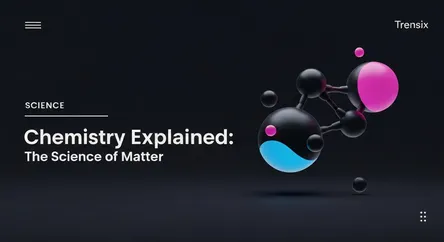Science
Chemistry Explained: The Science of Matter

A concise guide to chemistry, the central science. Explore what it is, why it's vital today, and how it impacts every aspect of our daily lives.
What is it?
Chemistry is the scientific study of matter—its properties, composition, and structure. It explores the atoms that make up all substances and how they interact, combine, and change. Often called the "central science," it bridges physics with other natural sciences like biology and geology. It examines everything from the simplest element to the most complex molecules, and the energy changes that accompany chemical reactions. This field provides the fundamental understanding needed to create new materials and solve complex problems.
Why is it trending?
Chemistry is at the forefront of major global innovations. It is crucial in developing sustainable technologies, such as advanced batteries for electric vehicles and more efficient solar panels. In medicine, breakthroughs in drug discovery and vaccine development, like mRNA technology, rely heavily on chemical principles. Furthermore, the creation of novel materials like biodegradable plastics and smart textiles is driving advancements in manufacturing and environmental science, keeping chemistry perpetually relevant and essential for future progress.
How does it affect people?
Chemistry is integral to modern life. The food we eat undergoes chemical reactions during cooking, and preservatives keep it safe. The medicines that cure diseases, the cleaning supplies that sanitize our homes, and the clothes we wear are all products of chemistry. It's responsible for the technology in our phones, the fuel in our cars, and the clean water we drink. Understanding chemistry helps people make informed decisions about their health, the environment, and the products they use every day.